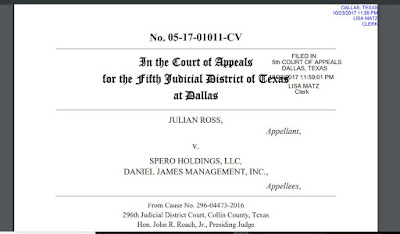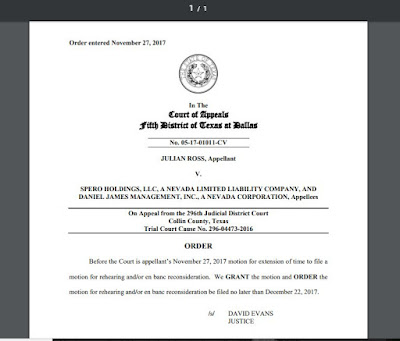In Texas a default judgment may be challenged by post-judgment motion or regular appeal within 30 days of the date it was signed, and by restricted appeal within six months of the judgment, but there is a catch that the average (or even well-versed) self-represented litigant is unlikely to be aware of. If a motion for new trial was filed in the trial court, a restricted appeal is no longer available. This recent opinion from the Dallas Court of Appeals illustrates the procedural perils of challenging a default judgment upon notice or discovery of it. A bill of review proceeding is another remedy to challenge a default judgment (when no longer appealable), but it - too - has rather daunting restrictions and requirements.
LOTS OF TRICKY TRAPS
(TRAP = TEXAS RULES OF APPELLATE PROCEDURE)
TRAP 25.1(d)(7)(B)
JULIAN ROSS, Appellant,
v.
SPERO HOLDINGS, LLC, A NEVADA LIMITED LIABILITY COMPANY, AND DANIEL JAMES MANAGEMENT, INC., A NEVADA CORPORATION, Appellees.
Court of Appeals of Texas, Fifth District, Dallas.
Julian Ross, for Appellant, Pro se.
Andrew H. Roberts, Kenneth W. Sloan, for Spero Holdings, LLC a Nevada Limited Liability Company, and Daniel James Management, Inc., A Nevada Corporation, Appellee.
On Appeal from the 296th Judicial District Court, Collin County, Texas, Trial Court Cause No. 296-04473-2016.
Dismissed.
Before Justices Lang, Evans, and Schenck.
MEMORANDUM OPINION
Opinion by Justice DAVID EVANS.
This appeal was filed August 25, 2017, almost six months after the trial court signed the challenged judgment. The appeal was filed as a restricted appeal, with appellant stating he "did not timely file a request for findings of fact and conclusions of law, and all the requirements of Texas Rule of Appellate Procedure 25.1 generally and 25.1(d) specifically are met in this case or are otherwise satisfied by this notice of appeal." See TEX. RS. APP. P. 25.1, 30.
As it pertains to restricted appeals, rule 25.1(d) requires in relevant part that the notice of appeal state appellant did not timely file either a post-judgment motion or request for findings of fact and conclusions of law. See id. 25.1(d)(7)(B).
Notice of Restricted Appeal
from the Appellate Record
The clerk's record in the appeal reflects appellant timely filed a post-judgment motion for new trial. Noting this, appellees have moved to dismiss the appeal for want of jurisdiction.
Appellant has filed a response, asserting two main arguments. First, he asserts appellate rule 2 allows the Court to suspend the requirement in rule 25.1(d) that to be entitled to a restricted appeal appellant must not have filed a timely motion for new trial. See TEX. R. APP. P. 2 (authorizing court of appeals to suspend rule "to expedite a decision or for other good cause"). Second, he asserts the Court "has jurisdiction under a Bill of Review standard." Neither of these arguments has merit. Rule 2 does not authorize a court to exercise jurisdiction where none exists, and a bill of review is a trial court proceeding that must be filed in the court that rendered the original judgment. See Frost Nat'l Bank. v. Fernandez, 315 S.W.3d 494, 504 (Tex. 2010) (bill of review); Tejas Elevator Co. v. Concord Elevator, Inc., 982 S.W.2d 578, 579 (Tex. App.-Dallas 1998, no pet.) (rule 2).
Because appellant filed a timely motion for new trial, he is precluded from filing a restricted appeal. See Lab Corp. of Am. v. Mid-Town Surgical Ctr., Inc., 16 S.W.3d 527, 528 (Tex. App.-Dallas 2000, no pet.). Accordingly, we grant appellees' motion and dismiss the appeal. See TEX. R. APP. P. 42.3(a).
JUDGMENT
In accordance with this Court's opinion of this date, we DISMISS the appeal.
We ORDER appellees Spero Holdings, LLC, A Nevada Limited Liability Company, and Daniel James Management Inc., a Nevada Corporation, recover their costs, if any, of this appeal from appellant Julian Ross.
ANOTHER TRAP (OR SHALL WE SAY ELECTRONIC STICKERLISM?)
MOTION REJECTED BECAUSE NOT IN TEXT-SEARCHABLE PDF
ALSO SEE CITED CASE FROM THE SAME COURT OF APPEALS
LABORATORY CORPORATION OF AMERICA, Appellant
v.
MID-TOWN SURGICAL CENTER, INC., Appellee
Court of Appeals of Texas, Dallas.
528John Edgar Sherman, Houston, for Appellant.
D. Kevin McCorkindale, Kasselman & McCorkindale, P.C., Plano, for Appellee.
Before Justices LAGARDE, MOSELEY, and FITZGERALD.
OPINION
Opinion By Justice LAGARDE.
This is a restricted appeal from a default judgment signed December 29, 1998 by the trial court. Upon review of the record, this Court, on its own motion, questions its jurisdiction over the appeal on two grounds: (1) appellant could not utilize the restricted appeal procedures because it timely filed a postjudgment motion to set aside the default judgment; and (2) the notice of appeal was untimely under rule of appellate procedure 26.1(c) because it was filed six months and seventeen days after the trial court signed the judgment. See TEX. R. APP. P. 30, 26.1.
On March 20, 2000, pursuant to rule 42.3, the Court notified the parties that the case would be dismissed for want of jurisdiction unless appellant or any party desiring to continue the appeal filed with this Court, within ten days, a response showing grounds for continuing the appeal. See TEX. R. APP. P. 42.3. As of the date of this opinion, no party has filed a response to the notice.
The record shows the trial court signed a default judgment against appellant on December 29, 1998. On January 28, 1999, appellant filed a motion to set aside the default judgment. On July 16, 1999, appellant filed a notice of restricted appeal.
Timely Filing of a Postjudgment Motion
We lack jurisdiction over this appeal because appellant timely filed a postjudgment motion, which barred him from perfecting his appeal under rule 30. Rule 30 permits a restricted appeal only when the appellant "did not participate-either in person or through counsel-in the hearing that resulted in the judgment complained of" and "did not timely file a postjudgment motion." TEX. R. APP. P. 30 (emphasis added). A motion for new trial is timely if filed within thirty days after the judgment was signed. See TEX. R. CIV. P. 329b(a). We deem appellant's motion to set aside the default judgment to be a motion for new trial because a motion for new trial following a default judgment requests that the default judgment be set aside. See Craddock v. Sunshine Bus Lines, 134 Tex. 388, 393, 133 S.W.2d 124, 126 (1939); see also Estate of Pollack v. McMurrey, 858 S.W.2d 388, 390 (Tex.1993) (citing Craddock, 134 Tex. 388, 133 S.W.2d 124).
The record shows appellant filed a motion to set aside the default judgment, the equivalent of a motion for new trial, on January 28, 1999. The motion was filed thirty days after the signing of the judgment and was timely. Because appellant timely filed a postjudgment motion, rule 30 does not permit appellant to bring a restricted appeal. Therefore, appellant had to file his notice of appeal within ninety days after the trial court signed the judgment, which it failed to do. See TEX. R. APP. P.26.1(a)(2); Thomas v. Texas Dep't of Criminal Justice-Institutional Div., 3 S.W.3d 665, 666-67 (Tex.App.-Fort Worth 1999, no pet.). Accordingly, we lack jurisdiction over this appeal.
Untimely Notice of Appeal
Alternatively, even if the timely postjudgment motion did not bar appellant from using the restricted appeal procedure, the record does not show appellant
529
*529timely perfected the appeal as a restricted appeal. Rule of appellate procedure 30, which governs restricted appeals, requires that the notice of appeal be filed within the time specified by rule 26.1(c). See TEX. R. APP. P. 30. Rule 26.1(c) requires that the notice of appeal be filed within six months after the judgment was signed. See TEX. R. APP. P. 26.1(c). Rule 26.3 permits an extension of time to file the notice of appeal for fifteen days after the deadline for filing the notice of appeal. See TEX. R. APP. P. 26.3. Thus, appellant had to file the notice of appeal within six months and fifteen days after December 28, 1998. The record shows the notice of appeal was filed six months and seventeen days after the judgment was signed. A timely notice of appeal is a requirement for this Court's jurisdiction. See Wichita Bldg. Corp. v. Lenz, 458 S.W.2d 829, 831 (Tex.Civ.App.-Fort Worth 1970, no writ); see also State v. Organic Composting Resources Co., 925 S.W.2d 129, 130 (Tex.App.-Austin 1996, no writ). In this case, appellant did not timely file the notice of appeal; accordingly, we lack jurisdiction over the appeal.
We dismiss this appeal for want of jurisdiction.







No comments:
Post a Comment